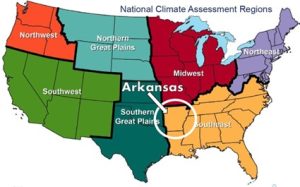Arkansas & Climate Change: No Warming. No Crisis. No Problem.
EXECUTIVE SUMMARY
This report will examine the scientific basis for claims of harmful climate-change-related effects in Arkansas.
Like other areas around the world, claims have been made that Arkansas is experiencing negative impacts from unusual and unprecedented warming driven by increasing human emissions of carbon dioxide (CO2). A “solution” to this supposed problem is to establish a “net zero” economy that adds no CO2 to the atmosphere. Here, we will rely on Arkansas state agency documents, data from American and global governmental agencies and peer-reviewed scientific studies to glean the truth about Arkansas’ climate and its impacts.
Several detailed climate assessments have been published recently that review historical climate records for Arkansas and the southeastern United States. These include the 5th National Climate Assessment (NCA5) report (USGCRP, 2023) and the National Oceanic and Atmospheric Administration’s (NOAA) Arkansas State Climate Summary (Runkle et al., 2022).

Figure 1: National Climate Assessment Regions. USGCRP (2018)
Promotion of the need to achieve “net zero” emissions is predicated on claims of existing and future devastating calamities resulting from CO2-enhanced warming.
The primary and quite surprising (to the authors) takeaway of our research is that the state of Arkansas has experienced virtually no warming over the past 100-plus years. The modest rise in temperature of 1.2 °C since the beginning of the Industrial Revolution that is exhibited throughout most areas of the world cannot be found in Arkansas. The data confirm that heatwaves and maximum temperatures have declined.
Our conclusion? There is no evidence of a climate crisis in Arkansas. Rather, its citizens are benefiting from ecosystems that are thriving and flourishing.
View and Download the complete Arkansas & Climate Change publication here:
